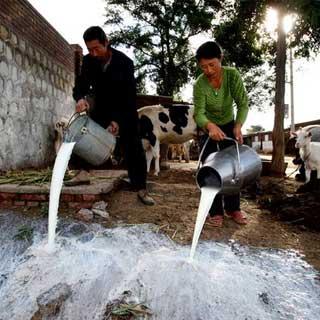
介绍:
Seven years after the 2008 melamine contamination scandal that rocked China’s dairy industry, small-scale Chinese farmers are struggling to remain in the industry as they face increasing domestic and international competition.
For one, there has been heavy investment by domestic dairy brands into creating their own modern dairy ranches in order to more closely control milk supply and quality. These modern ranches are behemoths, housing at least 10,000 heads of cattle and feature cutting edge technology like robotized milking and automated systems for feed, temperature, bedding and litter. China’s Shijiazhuang Junlebao Dairy Co. Ltd has begun construction on its own ranches in Zhangjiakou while one of China’s largest dairy firms, China Mengniu Dairy Co., has been investing in 14 modern ranches since 2013.
These modern ranches are expected to phase out the small farms currently contracted with these firms, according to analyst Song Liang. Already, farmers report that dairy companies have been buying only four-fifths of their daily output since November.
China, furthermore, is one of the world’s largest dairy importers, having imported 1.5 million tons in nine months of 2014, a 36.5 percent increase from 2013. With more international free-trade agreements on the way, it will become even easier for overseas suppliers to join the race.
The recently concluded China-Australia Free Trade Agreement will also see the removal of all tariffs on Australian dairy products within four to eleven years, which will in turn lower the prices of imported milk products. Prices for Australian-made baby formula in China may fall to more than half their current price, as it did when tariffs were cut for New Zealand products in 2013.
Many local Australian dairy producers, taking advantage of Australia’s current good dairy reputation, are making moves to enter the Chinese market due to the pricing dominance of large supermarket chains in their own country. In May 2014, following a deal between China and Australia to expedite China’s quarantine protocols, Norco Cooperative, based in Queensland, Australia, became the first company to commercially ship fresh milk directly to China.
This will likely place even more of a burden on local farmers, particularly as the global surge in grain prices is set to lead to higher feed costs.
For now, they can only try their best to keep up, forced to kill some cattle to cut losses or selling their product at low costs to pig farmers, while the extra milk is spilt into the earth.
For Caixin Online, this is Christina Guo.
经历了2013年下半年的“奶荒”之后,鲜奶价格曾一路飙升至5元/公斤,很多奶农都花高价买入了奶牛。但2014年下半年以来,鲜奶价格进入下行通道,鲜奶收购价格一路下跌至3.3元/公斤,而与此同时,饲料售价居高不下,养殖成本上升,奶牛顿成了烫手山芋。
更要命的是奶企鲜奶用量减少,奶农的鲜奶交不上去,把交不上去的鲜奶倒掉,甚至把刚刚怀孕的奶牛卖掉成了奶农们不得已的选择。
不同于一般意义上的产能过剩,在乳业专家看来,收购标准提高,乳制品生产企业自身牧场增加,进口奶粉大量进入市场造成国产牛奶销量下降是奶农倒奶或卖牛的主要原因。
而最让奶农担心的是生产企业正在大规模自建牧场。数据显示,截至2013年5月,蒙牛乳业已在奶源建设方面累计投入超过40亿元,参股、合建了14座万头以上超大型现代牧场,其还将继续参与建设20座到30座超大型牧场,将新增投资30亿-35亿元建立规模化集约化牧场,三年内实现100%原奶由规模牧场提供。光明乳业也在武汉投资1.3亿元建设“生态示范牧场”,可饲养奶牛3000头,年产鲜乳1.3万吨。
大家还在听

